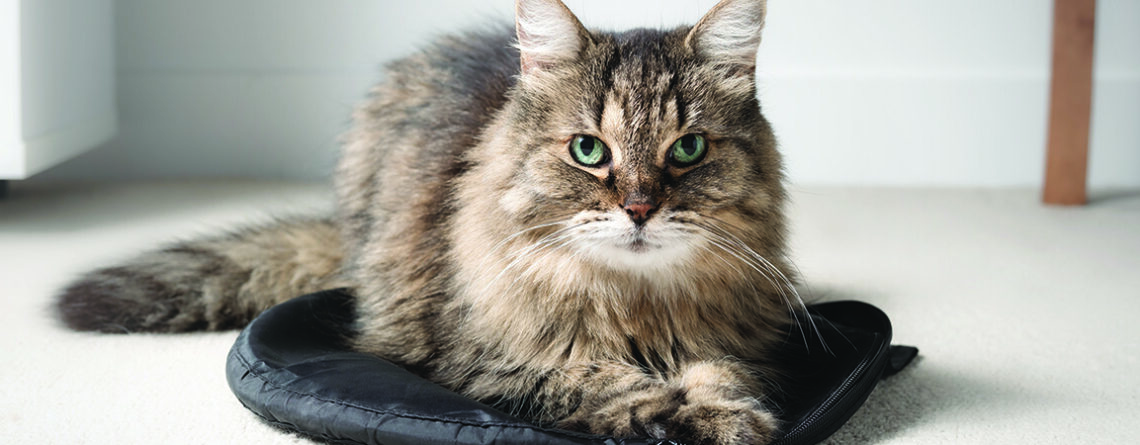Common Health Problems in Senior Cats
Cats can live up to 20 years old, but that doesn’t mean they’re immune to the effects of aging. As the years turn to decades, the aging process can creep on your cat, and you may notice your feline friend isn’t the bouncy kitten she once was. Aging is a normal process, but with age, can come certain health problems your cat is prone to.
As a loving cat parent, you want to help your cat age gracefully and catch any potential problems early. That way, your kitty can remain comfortable and you may be able to prevent a serious disease. In this blog post, I will talk through the signs of aging in cats, and the most common health problems we often see in senior felines.

Carol Doyle, BSc VN DVM
Carol DoyIe is a small pet veterinarian in a practice in Ashbourne, Co. Meath and is the human companion to her cats, Nala and Donal, two horses - Indie and Bella, and her dog Phoebe.
As a guest blogger and advisor, Carol shares her professional advice with pet owners, answering many of the questions that she gets asked regularly in-clinic.
Signs of Aging in Cats
Cats tend to hide their pain, making it difficult to properly care for them when they need it the most. But if you know what to look for, you can recognise pain symptoms early and get your kitty the help she needs. These signs below may indicate that your cat is approaching the senior life stage and that it’s time to re-evaluate her care needs.
- Reduced mobility
- Dramatic weight changes
- Sleeping more
- Behavioural changes
- Matted/oily fur
- Decreased appetite
- Vision loss
- House soiling
- Bad breath
- Increased thirst
Aging is a gradual process, and you may not recognise all the signs right away. If you do notice any, it’s important to take them to your local vet to be inspected so they can provide the best treatments and advice going forward.

Health Issues in Senior Cats
Arthritis
This is a painful condition where the joints erode cartilage until the bone scrapes against the bone. Cats suffering from arthritis may be less active, sleep more, and may be reluctant accessing elevated surfaces such as a table or counter. Also they can begin to groom themselves less due to pain on reaching certain areas and they may start to excessively lick affected joints. If you suspect your kitty has painful joints, make sure she has easy access to the litter box (such as not having to step over a wall or go upstairs). While there’s no cure for arthritis, your veterinarian can help you find ways to reduce and help manage the pain.
Kidney Disease
Kidney disease is a common health problem in senior cats. The exact cause is unclear, but infections, cancers, toxin exposure, and failure of the immune system all play a part for starting the slow process of damage, leading eventually to loss of function and kidney failure. Symptoms include an increase or decrease in urination and excessive thirst.
Your vet will examine your cat and suggest recommendations based on her condition and history. Annual blood work and urine testing is essential for early screening and detection of trends that may show early kidney disease. If caught early, your vet may be able to add months or years to your cat’s life, as well as increasing the quality of those years.

Loss of Vision
Older cats are prone to vision loss, and conditions such as cataracts, glaucoma and retinal detachment can begin to develop. Watch out for signs such as cloudiness or whiteness of the lens, dilated pupils and bumping into things. Your vet can prescribe medication that can help with these conditions, although some cats can get around in familiar environments. Avoid moving around furniture if your cat’s eyesight is failing, as this could throw them off their course and turn into an obstacle.
Loss of Hearing
Hearing loss is quite a common sign in older cats, with more mature cats becoming completely deaf. Hearing loss is generally a gradual process and is often only noted at advanced stages of deafness due to other senses (such as smell) adapting to cope. Deaf cats are able to adapt quite well, as long as their familiar routine is not suddenly modified. It is also possible to still communicate with your cat—you can teach hand signals as well as stomp your foot so she can feel vibrations.
Dental Disease
If you find your cat is having trouble chewing or picking up her food, she may be suffering from painful periodontal disease, a common problem in aging cats. It can have a serious affect on your cat’s appetite and can cause weight loss. A build-up of heavy plaque and tartar over the years can take a toll on your cat’s teeth, especially if they aren’t brushed or professionally cleaned on a regular basis. Make sure to schedule a thorough cleaning, and then follow up by brushing your cat’s teeth every day to help keep them clean. Keeping teeth and gums clean is an important part of keeping your cats health in good condition.
Cancer
Cancer is unfortunately something we commonly see in senior cats. One of the most common types of cancer seen in cats is lymphosarcoma, cancer of the lymphocytes (a type of blood cell) and lymphoid tissues. Make sure to take your cat to the vet right away if you notice any of these warning signs: appetite loss or unintentional weight loss; lumps or bumps that seem to be increasing in size, slow healing or no healing of sores, bleeding or other discharge from the mouth, nose or anus; uncommon body odour, lack of energy, trouble eating or swallowing, unexplained lameness that doesn’t improve; difficulty breathing, urinating or defecating.

